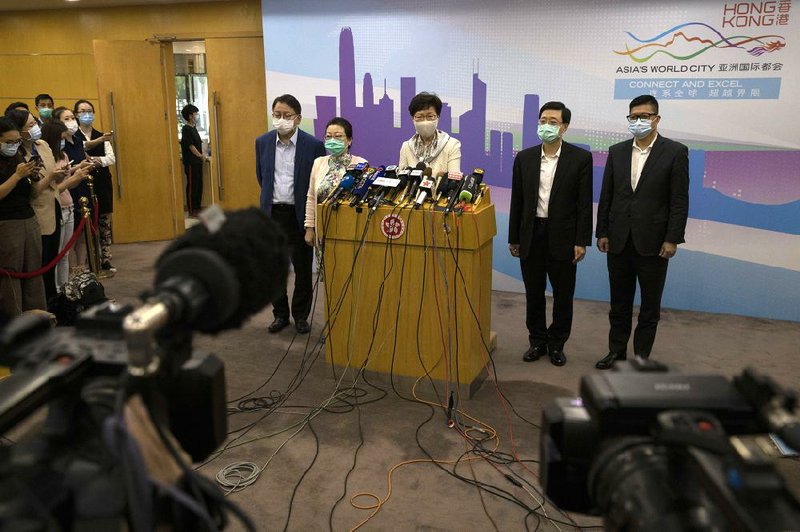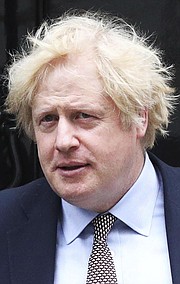HONG KONG -- British Prime Minister Boris Johnson pledged Wednesday to overhaul immigration rules to grant almost 3 million Hong Kong residents a pathway to British citizenship, a response to Beijing's move to impose a far-reaching security law that many fear will dismantle Hong Kong's political freedoms.
Johnson's vow was made as the United States, Canada, Australia and others face pressure from lawmakers and human-rights groups to offer residency to Hong Kong people fleeing deteriorating political circumstances in the former British colony, which was promised a high degree of autonomy under the terms of its 1997 handover to China.
London's move, which Johnson said he would implement when China formally enacts the security law, could emerge as among the most significant ramifications of Beijing's effort to undercut Hong Kong's freedoms and bring the city more closely under the Communist Party's authoritarian rule. It would potentially grant British residency and working rights to up to 40% of Hong Kong's population, raising the specter of a brain drain from the Asian financial center.
In op-eds published in the South China Morning Post and The Times of London, Johnson said the Chinese security law -- which will criminalize broadly worded offenses such as sedition, subversion and foreign interference -- gives Britain "no choice but to uphold our profound ties of history and friendship with the people of Hong Kong."
[Video not showing up above? Click here to watch » https://www.youtube.com/watch?v=_BUmCEEgGKM]
"Many people in Hong Kong fear their way of life -- which China pledged to uphold -- is under threat," he wrote. "If China proceeds to justify their fears, then Britain could not in good conscience shrug our shoulders and walk away."
Specifics of the new law are scant, but the approved proposal will allow Chinese security forces to operate in Hong Kong for the first time, enabling them to crush dissent as they do on the Chinese mainland. Hong Kong has been rocked in recent times by widespread protests calling for greater democracy and opposing Beijing's tightening grip.
Johnson wrote that his government would allow holders of British national passports to go to Britain for a renewable period of 12 months and gain the right to work. The move "could place them on a route to citizenship," he said.
These passports, a holdover from British rule issued to people born before 1997, currently allow holders to stay in Britain for six months but do not afford work rights or residency. About 350,000 people in Hong Kong hold these documents but an additional 2.5 million are eligible.
Lawmakers in other Western countries have issued similar calls to offer refuge to people fleeing the crackdown in Hong Kong. This week, Senate Majority Leader Mitch McConnell, R-Ky., said the U.S. response should "mirror those of other democracies who have opened their doors to Hong Kongers fleeing oppression."
"Our nation has a rich heritage of standing as a beacon of light and freedom, from refugees of war to those escaping the Iron Curtain," he said. "We should exercise it again for the people of Hong Kong."
China's Foreign Ministry said Wednesday that Britain had no jurisdiction over Hong Kong. Britain must "step back from the brink" and "stop interfering in Hong Kong's affairs and China's internal affairs," Foreign Ministry spokesman Zhao Lijian told reporters.
As the former colonial ruler, London was a signatory to the Sino-British Joint Declaration in which China agreed to preserve Hong Kong's political freedoms and way of life until 2047.
"The U.K. has had no sovereignty, governance or supervision over Hong Kong since its return [to Chinese rule]," Zhao said at a daily briefing in Beijing.
"Therefore, the British side has no right to cite the Sino-British Joint Declaration to make irresponsible remarks on Hong Kong affairs and interfere in China's internal affairs," Zhao said.
Hong Kong leader Carrie Lam accused foreign critics on Wednesday of displaying "blatant double standards."
After talks with officials in Beijing, Lam said China has the same right as the U.S. and Britain to enact legislation protecting its national security and that foreign criticism and threats of sanctions could not be justified. She also said China was compelled to take the step at the national level because opposition in Hong Kong's own legislature and among government critics made it impossible to do so locally.
"I can only say that the international community and some of the foreign governments have been adopting blatant double standards in dealing with this matter and commenting on this matter," Lam said.
"It is within the legitimate jurisdiction of any country to enact laws to protect and safeguard national security. USA is no exception. U.K. is no exception," Lam said.
Information for this article was contributed by Shibani Mahtani and Karla Adam of The Washington Post; and by The Associated Press.
A Section on 06/04/2020


